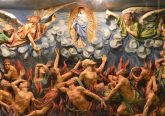Created at human birth or has Jesus always existed?
Q: Has Jesus always existed or was He created at His human birth? If He always existed, is there any mention of Him in the Old Testament? Mention of His birth is clear in the Scriptures, but what about prior to His birth?
A: This question sharply divided Christianity in the third and fourth centuries. The basic question was whether Jesus was created by the Father or whether He had existed eternally. A priest from Alexandria, Egypt, named Arius contended that Jesus was created by God the Father and consequently, “there was a time when the Son [Jesus] was not.” Arius’ ideas spread quickly, gaining much support from bishops, priests, and laity.
Arianism’s chief foe, St. Athanasius, however, contended that Jesus had existed eternally as a member of the Trinity, so even though we can say He took on flesh and was born in time, we cannot say that He was created. The text of the Nicene Creed was drafted in reaction to Arius: “I believe in one Lord Jesus Christ, the Only Begotten Son of God, born of the Father before all ages. God from God, Light from Light, true God from true God, begotten, not made, consubstantial with the Father.” The emphasis on “begotten, not made” emphasizes the belief that Jesus was not created.
If Jesus was not created, but always existed, we might expect to find mention of Him even in pre-Christian Jewish revelation. The Fathers of the early church contended that Jesus was prefigured throughout the Old Testament. As St. Augustine famously said, “The New Testament is hidden in the Old, and the Old is revealed in the New.”
By some accounts there are hundreds of allusions to Jesus and prophecies fulfilled by Him in the Old Testament. For instance, among the most frequently cited prophecies is from the Prophet Isaiah. Originating perhaps in the eighth century before Christ, Isaiah wrote, “The Lord will give you a sign: the virgin will conceive a child and will give birth to a son and will call Him Emmanuel –‘God is with us’” (7:14). The prophecy appears to be fulfilled (and is even quoted) in Matthew 1:20-23: “‘. . . [Mary] will bear a son and you are to name Him Jesus, because He will save his people from their sins.’ All this took place to fulfill what the Lord had said through the prophet ‘Behold, the virgin shall be with child and bear a son, and they shall name him Emmanuel . . .’”
Early Christians also saw in the figures of the Old Testament a preparation for the coming of Jesus. The suffering servant in Isaiah is seen as a type, or correspondence, to Christ. Job, a good man who suffered, though he did no wrong, is seen as pointing to Christ. The brothers of Joseph, son of Jacob, were jealous of him and attempted to put him to death – an allusion to the kind of death that Christ would suffer.
The church believes that Jesus as a person of the Trinity existed from all time, though by the incarnation He was born in time. We can discern Jesus’ presence from the genesis of revelation, a reminder of God’s plan of salvation from the beginning by which His only Son would come among us as a man to offer us salvation.














